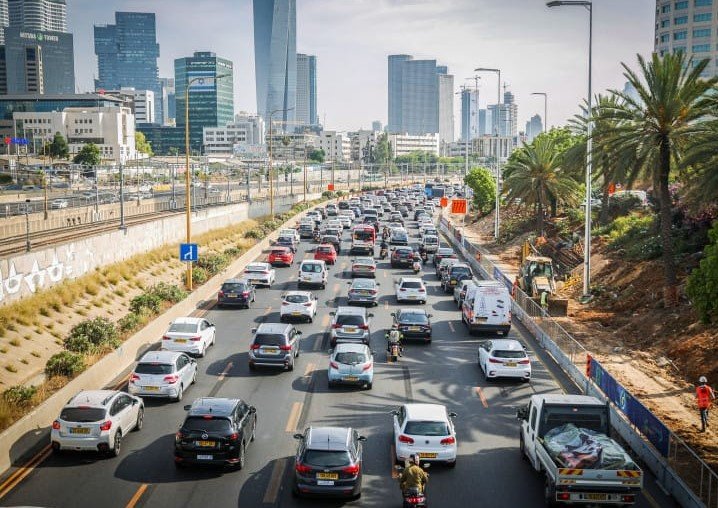Tel Aviv drivers faced massive traffic jams on Sunday, September 28, 2025, as repair work on the busy HaShalom Bridge shut down lanes on the Ayalon Highway. The chaos stems from a government ban on working during Shabbat, forcing renovations into weekdays and drawing sharp criticism from opposition leaders who say it puts politics over public needs.
This ongoing issue highlights tensions between religious traditions and modern infrastructure demands in Israel. With ultra-Orthodox parties pushing against Sabbath labor, the decision has left thousands stuck in gridlock, raising questions about how to balance faith and daily life in a bustling city.
What Sparked the Current Traffic Nightmare
The repair work at HaShalom Bridge began right after midnight on Sunday and will run until Tuesday evening. Officials closed most lanes on the Ayalon Highway, leaving just one open in each direction under the bridge.
This setup blocks key access points, like northbound entries from Tel Aviv and southbound from Givatayim. Drivers also cannot make certain turns, adding to the confusion.
Nearby, light rail fixes on Al Parashat Derachim Road limit turns from Namir Road, another major route. These combined efforts have turned usual commutes into hours long ordeals.

Experts say such projects used to happen on Shabbat when roads are quieter. Now, with the ban, weekdays bear the brunt, affecting over 150,000 daily users of this vital artery.
Political Backlash and Public Outcry
Opposition leader Yair Lapid blasted the government, claiming it cares more about politics than citizens. He pointed to ultra-Orthodox influence as the main reason for avoiding Shabbat work.
Social media buzzed with frustration, as posts from drivers shared stories of being stuck for hours. One user described a two hour trip to work that normally takes half that time.
This is not the first clash. Back in 2018, similar bans led to court petitions and public debates. Today, in 2025, the issue feels even more pressing with growing urban traffic.
Polls show most Israelis support Shabbat work for essential infrastructure. A recent survey found 65 percent favor it to cut weekday disruptions.
How the Ban Affects Daily Life
Commuters report delays doubling or tripling their travel times. Businesses near the area see fewer customers, and public transport struggles with reroutes.
Emergency services worry about slower response times in jams. Schools and offices advise remote work where possible, but not everyone can.
Here are some key impacts on residents:
- Increased fuel costs from idling in traffic.
- Higher stress levels leading to road rage incidents.
- Economic losses estimated at millions in lost productivity.
Parents picking up kids face extra hurdles, and delivery services reroute packages, causing widespread delays.
Historical Context of Shabbat Work Rules
Israel’s status quo agreement dates back decades, allowing Shabbat work only for life saving needs. Ultra-Orthodox groups argue infrastructure does not qualify.
Yet, past projects like train bridges often happened on weekends to minimize harm. In 2024, a similar debate over a Jerusalem Tel Aviv road project endangered drivers when work shifted to weekdays.
Recent events, like protests blocking the Ayalon Highway in 2023 and 2024, show how traffic issues tie into broader social tensions.
Today, with Tel Aviv’s population booming to over 500,000, efficient roads are crucial. Experts predict if bans continue, annual traffic costs could rise by 20 percent.
Potential Solutions and Future Outlook
Transportation officials suggest alternatives like night shifts or advanced planning to ease burdens. Some push for legal changes to allow more flexible Shabbat rules.
Advocates for change include city mayors who filed petitions in the past. They argue public safety trumps strict observance in non emergency cases.
A table outlining proposed fixes:
| Solution | Benefits | Challenges |
|---|---|---|
| Weekend Work Permits | Reduces weekday jams | Religious opposition |
| Nighttime Repairs | Limits peak hour impact | Higher costs for labor |
| Tech Upgrades | Uses drones for faster fixes | Initial investment needed |
| Public Transport Boost | Encourages alternatives | Needs more funding |
These ideas could prevent future snarls if adopted soon.
As Tel Aviv grows, finding a middle ground is key. Share your thoughts on this issue in the comments below, and pass this article along to friends dealing with the jams. Your input could spark real change.
